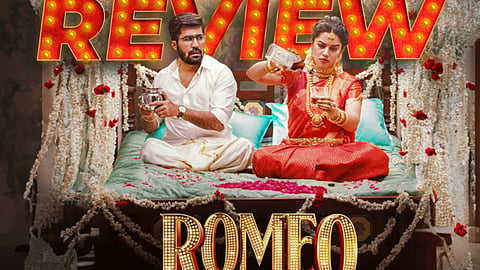Romeo Movie Review: Impressive performances elevate this all-too-familiar story
Romeo (3 / 5)
The name ‘Romeo’ has now become synonymous with a man who is a hopeless romantic. While Shakespeare’s Romeo had a lot more to him than this description, the name has been reduced to just this over the years. In his latest film, Romeo, Vijay Antony embodies a modern interpretation of this character rather than Shakespeare's multifaceted Romeo. While his performance is captivating, the film's plot lacks originality.
Director: Vinayak Vaithianathan
Cast: Vijay Antony, Mrinalini Ravi, VTV Ganesh, Yogi Babu, Thalaivasal Vijay, Roju, Shalini, Siva Sha Ra, Ilavarasu
In a way, Romeo resembles a few Shah Rukh Khan films. Rab Ne Bana Di Jodi’s trope of a man inventing a new persona to win over his resentful wife is similar to the plot of Romeo. Shah Rukh’s fear of fire in Om Shanthi Om, and the iconic scene in which he tries to save his loved one from a burning palace, also resembles a scene or two in Romeo. Elements from Kaavalan, Mouna Ragam, etc can also be found. But despite these all too familiar tropes, Romeo holds promise. While the plot may lack originality, it still makes up for it with a light-hearted, entertaining experience.
The film kicks off with a tightly woven first half that, despite its familiarity, consistently tickles our funny bones and maintains a high momentum throughout. While VTV Ganesh and Yogi Babu take on the roles of the primary comedians, supporting actors such as Roju, Shalini, Siva Sha Ra, and even the lead, Vijay Antony, inject refreshing and eccentric humour into the mix.
Moreover, the film embraces meta elements, with Vijay Antony and VTV Ganesh tossing in self-referential jokes, along with nods to other popular films. For instance, when the age gap between Arivu and Leela is playfully teased, Arivu quips, “Yean indha Arya, Vijay Antony, ivangalaan pathu vayasu vidhyaasathula Kalyanam panalaya?” In another scene, when Arivu seeks help from his uncle VTV Ganesh, there's a subtle reference to Ganesh's character helping out Simbhu in Vinnaithaandi Varuvaayaa. However, the film isn't entirely devoid of cliched lines, such as, “Ponnunga thaali kattum bodhu azhuvanga, yean na adhukaprom vaazhkai full aah aamblainga namma dhaane azha porom?”
Vijay Antony’s characterisation in Romeo seems like he is almost in a new avatar. Ever since India Pakistan, the actor has been playing a series of serious roles, breaking the streak with this light-hearted and romantic character. In Romeo, his character Arivu is portrayed as nerdy yet deeply devoted to his wife. Arivu stands out as the green flag in a sea of red flags, exemplifying qualities that Leela perhaps doesn't fully appreciate. Vijay Antony has unlocked his wacky, vivacious side to fully fit into the shoes of Arivu. However, there's a moment in the film where this refreshing characterization takes a slight step back. In a scene where Arivu, typically portrayed as coy and timid, beats up a man who tries to wrong his wife, the narrative falls back on the damsel-in-distress trope. This conflicts with another scene in which Arivu questions, “Oru ponna adicha avan aambalai aayiduvana?” It makes you wonder if there are only certain stereotypical tropes that filmmakers can use to portray heroism.
The film is a mixed bag, yet it undeniably marks a breakthrough for Mrinalini, who has been exploring diverse roles for the past five years. In Romeo, she embodies a determined young woman, relentlessly pursuing her dreams despite facing numerous challenges. What sets her portrayal apart is the absence of any pity-inducing scenes. Instead, the audience connects with her passion and resilience, finding themselves rooting for her despite her perpetually angry demeanour. Leela is a well-written character, albeit with a few loose ends, and Mrinalini's portrayal adds an endearing, girl-next-door quality to her, making her all the more relatable.
Barath Dhanasekar's background score, particularly in the first half of the film, adds an intriguing dimension to the narrative. I quite grooved to his upbeat remix of ‘Marumagale Marumagale Vaa Vaa’ used in a scene where Arivu realises Leela is not a goody two shoes. While the other songs were mesmeric, the editing choices occasionally overshadowed their quality. Songs like 'Vethala' disrupt the flow of the narrative, appearing at moments when we’re eager for the story to progress. Additionally, certain prolonged scenes in the second half could have been trimmed to sustain the pace of the film.
Romeo is certainly flawed, just like the namesake character from Shakespeare’s classic. Its derivative nature cuts down on our intrigue of “Will they, won’t they.” Yet, it tries to bring in some originality with portions like Arivu’s childhood trauma. While the story is familiar, Vinayak Vathianathan manages to present it in a fresh light, offering a clean comic entertainer that falls somewhere between dazzling and underwhelming. At the end of the day, Romeo has a happy ending that makes for a quality family watch on a long weekend. And hey, at least it's not as tragic as Shakespeare's Romeo and Juliet.

